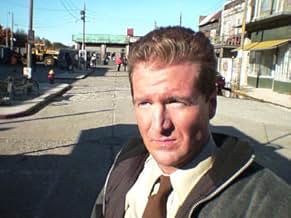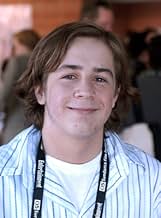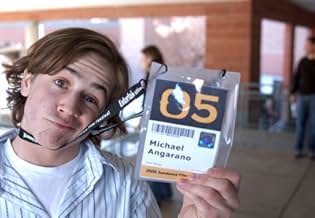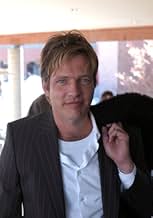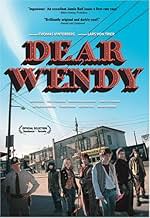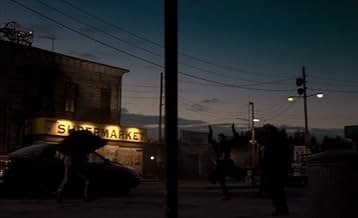A young boy in a nameless, timeless American town establishes a gang of youthful misfits united in their love of guns and their code of honor.A young boy in a nameless, timeless American town establishes a gang of youthful misfits united in their love of guns and their code of honor.A young boy in a nameless, timeless American town establishes a gang of youthful misfits united in their love of guns and their code of honor.
- Awards
- 1 win & 5 nominations total
- Director
- Writer
- All cast & crew
- Production, box office & more at IMDbPro
Featured reviews
I liked "Dear Wendy". It was well photographed, had good cast and the rocking soundtrack provided the light icing on a film that is both sad and happy from the inside.
It is a bit puzzling that this film has been seen as anti-American propaganda. It does criticise the American values - but so do many American films that are hardly described as anti-American. The message is even softened by placing the film in surreal, small mining town that is so detached geographically that you can almost feel the fiction. In some sense it bears resemblance to the village set on Brechtian stage in "Dogville" (compare for example the "stageness" of main street) by Lars von Trier, whose touch can be seen in "Dear Wendy", too.
It can be also seen as an anti-gun lecture - but that is just one perspective to it and in my opinion also possible to ignore.
The only turnoff is the somewhat annoying narration by the main character, that explains too much and leaves less for the viewer to ponder. I might be also giving one star too much, because the end scene, where the film picks up the pace left such a strong impression on me, and not just because of being so well shot action.
It is a bit puzzling that this film has been seen as anti-American propaganda. It does criticise the American values - but so do many American films that are hardly described as anti-American. The message is even softened by placing the film in surreal, small mining town that is so detached geographically that you can almost feel the fiction. In some sense it bears resemblance to the village set on Brechtian stage in "Dogville" (compare for example the "stageness" of main street) by Lars von Trier, whose touch can be seen in "Dear Wendy", too.
It can be also seen as an anti-gun lecture - but that is just one perspective to it and in my opinion also possible to ignore.
The only turnoff is the somewhat annoying narration by the main character, that explains too much and leaves less for the viewer to ponder. I might be also giving one star too much, because the end scene, where the film picks up the pace left such a strong impression on me, and not just because of being so well shot action.
While the cinematography was very pleasing to the eyes and the young actors did a commendable job, the story itself leaves something to be desired. Though it starts out with an interesting concept, Dear Wendy winds its way into a ridiculous hole. The "twists" are random and unfounded, probably there for the sole reason of providing conflict. Also, the movie tends to be sluggish: watching for an hour feels like two or three. On the positive side, the young actors did a very good job (for the most part). At times dramatic pauses cause more laughter than thought, but that's difficult to avoid with the script. Eye-catching camera angles were used, along with some interesting techniques. To sum up, the director, cinematographer, and actors are probably usually amazing at their jobs; however, if they enjoy their careers they should stay away from writing like this.
I went into this film extremely hesitant. I don't know Vinterberg well, but I do know there isn't much about Lars that I like at all. Top that with a subject matter that I'm rather sensitive about as well. But the film was beautifully filmed and the performances were enjoyable. I enjoyed all of it. I disagree with critics who say the film attacked America or had a heavy-hitting message in it. I think it's subtler than that. For me it was the big surprise of Sundance 05. Rich and fun. In the script, the characters were twice as old as those in the film, and I think Vinterberg made a wise choice in changing that. What is powerful in a teenager can look dorky in a 30-something.
I saw this movie in France with a large group of friends, something I highly recommend. We all seemed to have a different take on the film and each of us was able to draw something unique from it. Some loved it; some hated it. One of us focused on the powerful characters, another on the coming-of-age aspect, another on the gun control issues, etc. I saw it as a commentary on the power of fear in light of current world events and about how allowing that fear to control your life can ultimately bring about the very tragedy of which you are most afraid.
Dear Wendy certainly lends itself well to conversations that surpass the standard post-movie fare. I am looking forward to it coming stateside so I can see it again with other friends and see what reactions the film provokes in them ...
Dear Wendy certainly lends itself well to conversations that surpass the standard post-movie fare. I am looking forward to it coming stateside so I can see it again with other friends and see what reactions the film provokes in them ...
"Dear Wendy" comes from the talents that brought us "Festen" and "It's All About Love" (both written and directed by Thomas Vinteberg), "Dogville," "Dancer in the Dark" and "Breaking the Waves" (written and directed by Lars Von Trier). They have collaborated on Dear Wendy, with Vinteberg at the helm and penned by Trier.
This is my favorite kind of movie; it begins with a "what if..." premise, which the storytellers follow with relentless commitment. In this case, the premise is "what if some misfit kids fell in love with their guns." Well, they'd give them names, they'd practice shooting and have a secret clubhouse, they'd study the famous gun-toting heroes of old, and the relationship they have with their weapons would become a mirror for their relationships with the world. All of which are pursued beautifully in the film.
Quite a few American movie critics read this film as a critique of American society, and they resent a European making a film about small-town America. An oft-vented complaint is that Trier has no business criticizing a country which he's never actually visited. I don't think, however, that this is ultimately a film about guns; the relationship these kids have with their guns is simply a unique window through which the filmmakers have chosen to show us the rich inner lives of the protagonists. They could have used a dysfunctional family (Festen), or movie musicals (Dancer In The Dark) or a tolling church bell (Breaking The Waves) to show us that world - but in this case it's guns.
Within the limits of the film medium - 10,000 words of dialog and around 140,000 frames of film - the choices of the filmmaker often revolve about what to leave OUT rather than what to put IN. This is a film that could be used as a textbook for economists. The script is tight - not a word out of place, although the narration feels conversational and casual. A film about child misfits and their guns could easily follow thematic red herrings all over the place in pursuit of social commentary, but "Dear Wendy" is utterly restrained - in spite of the "loaded" subject matter. On the cutting room floor are social commentary, cliché, and many of the cinematic crutches which Trier and Vinterberg rejected in their Dogme 95 days.
Any film lover who cares to see a film utterly committed to its premise, a film made with economy and efficiency, a film full of sweet irony, a film of deceptive simplicity, would do well to check out "Dear Wendy."
This is my favorite kind of movie; it begins with a "what if..." premise, which the storytellers follow with relentless commitment. In this case, the premise is "what if some misfit kids fell in love with their guns." Well, they'd give them names, they'd practice shooting and have a secret clubhouse, they'd study the famous gun-toting heroes of old, and the relationship they have with their weapons would become a mirror for their relationships with the world. All of which are pursued beautifully in the film.
Quite a few American movie critics read this film as a critique of American society, and they resent a European making a film about small-town America. An oft-vented complaint is that Trier has no business criticizing a country which he's never actually visited. I don't think, however, that this is ultimately a film about guns; the relationship these kids have with their guns is simply a unique window through which the filmmakers have chosen to show us the rich inner lives of the protagonists. They could have used a dysfunctional family (Festen), or movie musicals (Dancer In The Dark) or a tolling church bell (Breaking The Waves) to show us that world - but in this case it's guns.
Within the limits of the film medium - 10,000 words of dialog and around 140,000 frames of film - the choices of the filmmaker often revolve about what to leave OUT rather than what to put IN. This is a film that could be used as a textbook for economists. The script is tight - not a word out of place, although the narration feels conversational and casual. A film about child misfits and their guns could easily follow thematic red herrings all over the place in pursuit of social commentary, but "Dear Wendy" is utterly restrained - in spite of the "loaded" subject matter. On the cutting room floor are social commentary, cliché, and many of the cinematic crutches which Trier and Vinterberg rejected in their Dogme 95 days.
Any film lover who cares to see a film utterly committed to its premise, a film made with economy and efficiency, a film full of sweet irony, a film of deceptive simplicity, would do well to check out "Dear Wendy."
Did you know
- TriviaIn Lars von Trier's script, the main characters were in their 20s. Director Thomas Vinterberg decided to change it, so they became children instead. Lars von Trier later stated that he thought the age change was a brilliant idea.
- GoofsThe plan of Electric Square labels "CENTRE POLE" using the British rather than the American spelling. The film was shot in Denmark and Germany rather than in West Virginia, USA.
- ConnectionsFeatured in Letters to Dear Wendy (2005)
- SoundtracksShe's Not There
Written and Performed by The Zombies
Zombies Heaven, "Begin Here & Singles" (c)
Courtesy of Marquis Enterprises
- How long is Dear Wendy?Powered by Alexa
Details
- Release date
- Countries of origin
- Official sites
- Language
- Also known as
- Calles peligrosas
- Filming locations
- Production companies
- See more company credits at IMDbPro
Box office
- Budget
- DKK 50,000,000 (estimated)
- Gross US & Canada
- $23,106
- Opening weekend US & Canada
- $8,222
- Sep 25, 2005
- Gross worldwide
- $607,229
- Runtime
- 1h 45m(105 min)
- Color
- Sound mix
- Aspect ratio
- 1.66 : 1
Contribute to this page
Suggest an edit or add missing content


